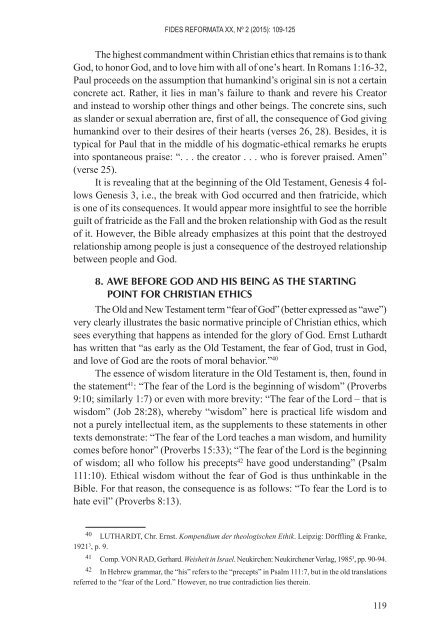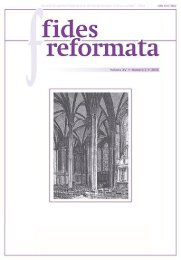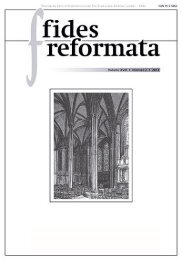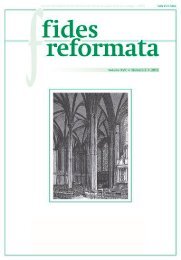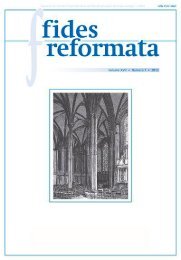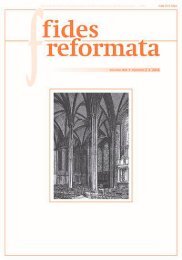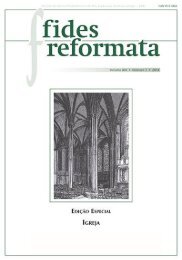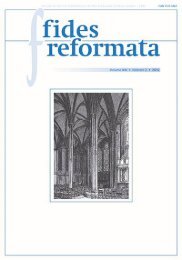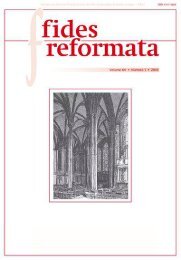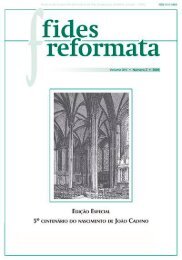Fides 20 N2 - Revista do Centro Presbiteriano Andrew Jumper
Revista Fides Reformata 20 N2 (2015)
Revista Fides Reformata 20 N2 (2015)
You also want an ePaper? Increase the reach of your titles
YUMPU automatically turns print PDFs into web optimized ePapers that Google loves.
FIDES REFORMATA XX, Nº 2 (<strong>20</strong>15): 109-125<br />
The highest commandment within Christian ethics that remains is to thank<br />
God, to honor God, and to love him with all of one’s heart. In Romans 1:16-32,<br />
Paul proceeds on the assumption that humankind’s original sin is not a certain<br />
concrete act. Rather, it lies in man’s failure to thank and revere his Creator<br />
and instead to worship other things and other beings. The concrete sins, such<br />
as slander or sexual aberration are, first of all, the consequence of God giving<br />
humankind over to their desires of their hearts (verses 26, 28). Besides, it is<br />
typical for Paul that in the middle of his <strong>do</strong>gmatic-ethical remarks he erupts<br />
into spontaneous praise: “. . . the creator . . . who is forever praised. Amen”<br />
(verse 25).<br />
It is revealing that at the beginning of the Old Testament, Genesis 4 follows<br />
Genesis 3, i.e., the break with God occurred and then fratricide, which<br />
is one of its consequences. It would appear more insightful to see the horrible<br />
guilt of fratricide as the Fall and the broken relationship with God as the result<br />
of it. However, the Bible already emphasizes at this point that the destroyed<br />
relationship among people is just a consequence of the destroyed relationship<br />
between people and God.<br />
8. awe before god and his being as the starting<br />
point for christian ethics<br />
The Old and New Testament term “fear of God” (better expressed as “awe”)<br />
very clearly illustrates the basic normative principle of Christian ethics, which<br />
sees everything that happens as intended for the glory of God. Ernst Luthardt<br />
has written that “as early as the Old Testament, the fear of God, trust in God,<br />
and love of God are the roots of moral behavior.” 40<br />
The essence of wis<strong>do</strong>m literature in the Old Testament is, then, found in<br />
the statement 41 : “The fear of the Lord is the beginning of wis<strong>do</strong>m” (Proverbs<br />
9:10; similarly 1:7) or even with more brevity: “The fear of the Lord – that is<br />
wis<strong>do</strong>m” (Job 28:28), whereby “wis<strong>do</strong>m” here is practical life wis<strong>do</strong>m and<br />
not a purely intellectual item, as the supplements to these statements in other<br />
texts demonstrate: “The fear of the Lord teaches a man wis<strong>do</strong>m, and humility<br />
comes before honor” (Proverbs 15:33); “The fear of the Lord is the beginning<br />
of wis<strong>do</strong>m; all who follow his precepts 42 have good understanding” (Psalm<br />
111:10). Ethical wis<strong>do</strong>m without the fear of God is thus unthinkable in the<br />
Bible. For that reason, the consequence is as follows: “To fear the Lord is to<br />
hate evil” (Proverbs 8:13).<br />
40 LUTHARDT, Chr. Ernst. Kompendium der theologischen Ethik. Leipzig: Dörffling & Franke,<br />
1921 3 , p. 9.<br />
41 Comp. VON RAD, Gerhard. Weisheit in Israel. Neu kirchen: Neukirchener Verlag, 1985 3 , pp. 90-94.<br />
42 In Hebrew grammar, the “his” refers to the “precepts” in Psalm 111:7, but in the old translations<br />
referred to the “fear of the Lord.” However, no true contradiction lies therein.<br />
119


